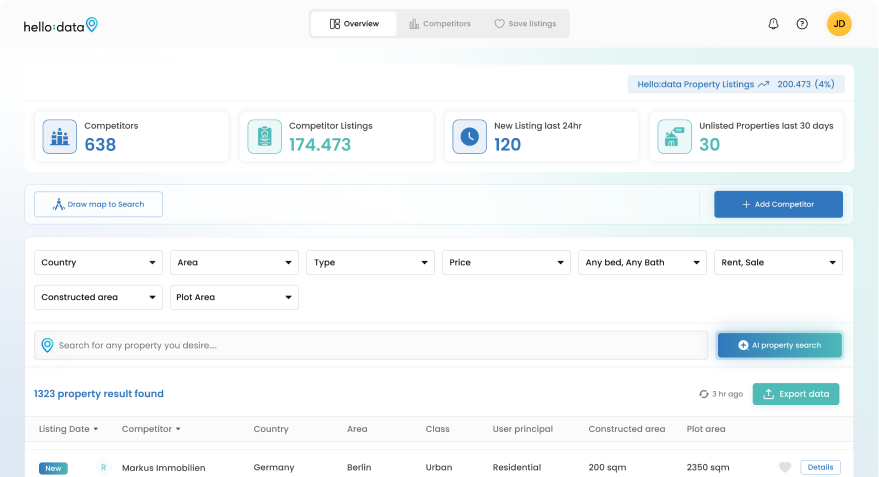Introduction
In real estate, a benchmark is a standard or reference point used to assess the performance and value of properties in the market. Benchmarks are crucial because they offer valuable information about market trends, investment performance, and property valuation.
How Technology is Changing Real Estate Benchmarks
Technology is changing how we approach these benchmarks. Artificial Intelligence (AI) is leading the way, allowing for more in-depth analysis and precise predictions. With AI, we can quickly analyze large amounts of data, resulting in better decision-making for real estate investments.
Hello:Here is a pioneering proptech company that stands out by using AI for real estate benchmarking. By incorporating advanced analytics, Hello:Here improves the understanding of market dynamics and property values. The innovative Hello Data Property Tracking app aggregates listings far surpassing traditional platforms like Zillow, offering users access to an extensive database for informed decision-making.
This shift towards AI-driven solutions also opens up new avenues for due diligence automation, making the process more efficient and thorough. Furthermore, with tools that allow investors to diversify their portfolios, they can mitigate risks and maximize returns.
Moreover, understanding concepts like Debt Service Coverage Ratio (DSCR) becomes crucial for investors aiming to assess property performance accurately. Additionally, being aware of factors such as external obsolescence can significantly impact investment decisions.
We are not just changing how we use benchmarks but also giving investors practical insights while leading the way in AI-driven real estate solutions.
Understanding Benchmarks in Real Estate
A benchmark in real estate is a standard or point of reference used to measure properties, market segments, or investment performances. These benchmarks are crucial in the real estate market as they assist investors, analysts, and stakeholders in evaluating various aspects of property investment and market dynamics.
Role of Benchmarks
Benchmarks serve several critical functions:
- Performance Measurement: They provide a clear framework for assessing the performance of real estate investments. For instance, an investor can compare the return on investment (ROI) of a particular property against industry benchmarks to determine its relative success.
- Market Comparison: By using benchmarks, stakeholders can compare different markets or segments within the same market. This comparison enables informed decision-making regarding where to invest based on average rental yields or sale prices.
- Risk Assessment: Benchmarks assist in identifying potential risks associated with specific investments. Analyzing how a property performs relative to established benchmarks can highlight underperforming assets that may require further scrutiny.
Importance for Investment Performance and Market Trends
Utilizing benchmarks is crucial when evaluating investment performance and analyzing market trends. Here’s why:
- Investment Performance Evaluation:
- Investors rely on key performance indicators (KPIs) such as ROI, capital growth, and rental yield to gauge their investments.
- Benchmarks set realistic expectations for these KPIs, allowing for a precise assessment of whether an investment is meeting its potential.
- Trend Analysis:
- Historical data tied to specific benchmarks enables comparison with current figures. This analysis reveals broader market trends over time.
- Recognizing these trends helps investors anticipate future movements in property values, which is vital when making strategic decisions.
- Informed Decision-Making:
- Armed with benchmark data, investors can make choices grounded in empirical evidence rather than speculation.
- This methodical approach reduces uncertainty and enhances investment strategies.
In summary, understanding benchmarks in real estate is essential for navigating investment landscapes effectively. They not only provide clarity around performance metrics but also illuminate market trends that guide strategic decisions. With technology driving innovations in data aggregation and analysis, like those offered by Hello:Here, the accessibility and relevance of these benchmarks continue to evolve, empowering investors with actionable insights for better outcomes.
Moreover, comprehending certain aspects like what constitutes a land-locked property, or the income approach in real estate appraisal can further enhance an investor’s understanding of the market. Additionally, grasping concepts such as indemnity in real estate, or the role of support vector machines in revolutionizing the industry could prove beneficial. Lastly, understanding elements like gain-to-lease could provide deeper insights into lease agreements and their financial implications.
Types of Real Estate Benchmarks
Real estate benchmarks can be categorized into two main types: market benchmarks and property-specific benchmarks. Each serves a distinct purpose in evaluating the market and assessing property performance.
Market Benchmarks
Market benchmarks provide a broad overview of the real estate landscape. They allow investors and stakeholders to gauge overall market conditions, ensuring informed decision-making.
1. Average Sale Prices
This benchmark reflects the average price at which properties in a specific area are sold. It plays a critical role in determining property value trends over time. By analyzing average sale prices, you can identify whether a market is appreciating or depreciating.
2. Rental Yields
Rental yield is another vital market benchmark that measures the income generated from rental properties relative to their purchase price. It is calculated as follows:
[ \text{Rental Yield} = \left( \frac{\text{Annual Rent}}{\text{Property Purchase Price}} \right) \times 100 ]
High rental yields often indicate a desirable investment opportunity, while low yields may signal oversupply or declining demand in certain areas. For instance, understanding concepts like rental arbitrage can help maximize these yields.
Property-Specific Benchmarks
Property-specific benchmarks focus on individual properties or localized markets, providing insights that are crucial for targeted investments.
1. Location-Specific Values
These benchmarks assess property values based on location characteristics such as proximity to amenities, schools, transportation links, and overall neighborhood desirability. Understanding these location-specific values helps investors pinpoint high-potential areas for future growth.
2. Comparative Analysis
By comparing similar properties within a localized area, investors can better understand how specific features—like square footage, number of bedrooms, and condition—affect property value. This analysis enables strategic pricing decisions and enhances negotiation power when purchasing or selling properties. For example, knowing what constitutes a warm shell condition can significantly influence such decisions.
Importance of Diverse Benchmarking
Utilizing both market and property-specific benchmarks creates a comprehensive framework for making real estate decisions. Market benchmarks offer a macro view, while property-specific benchmarks deliver micro-level insights.
This dual approach empowers investors to:
- Identify emerging market trends
- Evaluate investment opportunities more accurately
- Make informed decisions based on data-driven insights
Embracing these types of benchmarks positions investors for success in navigating the complexities of the real estate market. Understanding how each benchmark operates enhances your ability to spot lucrative opportunities tailored to your investment strategy. Furthermore, being aware of terms such as loss to lease, which refers to the difference between potential rental income and actual rental income due to vacancies or lower-than-market rents, can also provide valuable insights during property evaluations.
Additionally, exploring options like HELOCs, which allow homeowners to borrow against their equity in the home, could open up new avenues for funding investments or renovations
Analyzing Investment Performance with Benchmarks
Understanding investment performance in real estate requires a keen focus on essential Key Performance Indicators (KPIs). These metrics reveal the effectiveness of your investments and help gauge their success against established benchmarks. The primary KPIs to consider are:
1. Return on Investment (ROI)
This measures the profitability of an investment relative to its cost. Calculating ROI provides clarity on how effectively your money is working for you.
[ ROI = \left( \frac{\text{Net Profit}}{\text{Cost of Investment}} \right) \times 100 ]
2. Capital Growth
This reflects the increase in property value over time. Tracking capital growth is crucial for understanding long-term investment potential and market fluctuations. For instance, understanding the as-stabilized value in real estate investments can provide deeper insights into capital growth.
3. Rental Yield
This indicates the income generated from a property as a percentage of its value. It’s a vital metric for investors focused on rental properties.
[ Rental\ Yield = \left( \frac{\text{Annual Rental Income}}{\text{Property Value}} \right) \times 100 ]
Using these KPIs effectively necessitates comparing them against relevant benchmarks. Here’s how to do it:
- Identify Relevant Benchmarks: Determine which benchmarks align with your investment goals. For instance, if your target is a rental yield of 6%, locate market averages and assess how your properties measure up. A multifamily rent survey could provide valuable insights in this regard.
- Regular Monitoring: Continuously track these KPIs alongside benchmark data to identify trends and make informed decisions. Tools like HelloHere‘s AI-driven platform can streamline this process, providing real-time analytics and comparisons.
- Adjust Strategies Accordingly: If your ROI falls below the benchmark, investigate underlying factors such as property management issues or market conditions that may be impacting performance. Adjusting strategies promptly can enhance overall returns.
- Leverage Historical Data: Analyze historical performance against current benchmarks to understand shifts in the market landscape. Recognizing patterns enables strategic planning for future investments.
- Benchmark Against Peers: Evaluate how similar properties perform within the same market segment. This relative analysis can reveal opportunities or risks that may not be evident when looking at absolute numbers alone.
By utilizing these KPIs and benchmarking against established metrics, I can ensure my real estate investments are positioned for optimal performance while navigating the complexities of the market landscape. Understanding what constitutes a benchmark in real estate allows me to make data-driven decisions, fostering growth in my investment portfolio. Additionally, exploring options like the cheapest way to sell a house can further enhance my investment strategy by maximizing returns during property liquidation phases
Market Trends Analysis Using Benchmarks
Understanding how to learn about market trends in real estate is crucial for making sound investment decisions. By comparing historical data with current benchmarks, investors can identify significant trends that influence property values and rental rates.
Historical Data Comparison
- Evaluate Past Performance: Historical data provides insight into how properties have performed over time. By analyzing this data against current benchmarks, investors can recognize patterns.
- Identify Cycles: Real estate markets often move in cycles. Understanding past cycles helps predict future movements, allowing for strategic positioning.
Significance of Trend Analysis
Trend analysis plays an essential role in shaping investment strategies. Key aspects include:
- Informed Decision-Making: Investors equipped with trend insights can make educated choices on when to buy or sell properties.
- Risk Assessment: Recognizing upward or downward trends allows investors to assess potential risks associated with their investments.
- Strategic Planning: Identifying market shifts can guide long-term strategies, such as diversification or focusing on emerging neighborhoods.
Investors should utilize various tools and resources to gather relevant historical data and current benchmarks. This approach ensures a comprehensive understanding of the market landscape. Advanced analytics provided by platforms like Hello:Here empower investors by offering a deeper analysis of trends, enhancing their ability to capitalize on opportunities.
Engaging with these insights not only informs individual investment decisions but also contributes to a broader understanding of the real estate market’s dynamics. By staying informed about market trends, you position yourself to navigate fluctuations effectively and maximize your investment potential.
Regulatory Compliance and Industry Standards in Real Estate Benchmarking
Regulatory compliance in real estate is essential for maintaining market integrity and protecting stakeholder interests. Regulatory bodies play a crucial role in establishing benchmarks that ensure adherence to essential laws and standards.
The Role of Regulatory Bodies
- Establishing Zoning Laws: These laws dictate how land can be used, influencing development decisions. Benchmarks related to zoning help investors understand permissible uses and the potential for property appreciation.
- Building Codes Compliance: Standards set forth by regulatory bodies ensure safety and quality in construction. Compliance benchmarks guide developers and investors alike, promoting safe living conditions while adhering to legal requirements.
- Environmental Regulations: Environmental compliance benchmarks ensure that real estate projects consider ecological impact. Adhering to these regulations is not only a legal obligation but also a market differentiator, enhancing property value.
Industry Reports and Benchmarking Data
Industry reports are vital resources that compile benchmarking data for real estate professionals. These reports often include:
- Market Analysis: Comprehensive insights into pricing trends, rental yields, and demographic shifts. Such analysis allows investors to make informed decisions based on credible data.
- Comparative Studies: Benchmarking against regional or national averages helps stakeholders identify underperforming assets or lucrative opportunities within specific markets.
- Risk Assessment Tools: Reports often include tools for evaluating compliance risks. By using benchmarking data, investors can gauge the likelihood of regulatory challenges impacting their investments.
Guiding Investors and Stakeholders
Access to reliable benchmarking data empowers stakeholders across the real estate spectrum:
- Investors can assess market viability and navigate potential risks effectively.
- Developers utilize benchmarks to align their projects with regulatory expectations, minimizing delays or costly modifications.
- Property Managers rely on compliance standards to maintain operational integrity, ensuring tenant satisfaction while adhering to legal obligations.
The integration of robust regulatory compliance standards with industry benchmarks enhances transparency within the real estate market. This synergy creates a safer environment for investment and development, fostering trust among buyers, sellers, and regulators alike.
Understanding these dynamics positions investors to leverage benchmarking effectively, aligning their strategies with compliance requirements while maximizing returns. As technology continues to evolve, so too will the methods for gathering and analyzing this critical data, making it easier than ever to navigate the complex landscape of real estate investment.
Additionally, understanding specific financial instruments such as the HUD BSPRA credit or the HUD 221(d)(4) loan can provide further advantages in navigating this landscape. Moreover, exploring options like a seller carry back could offer innovative financing solutions. Understanding the Gross Income Multiplier (GIM) is also crucial for evaluating investment opportunities effectively.
Hello: Revolutionizing Real Estate Benchmarking with AI Technology
Hello Here SL is leading the way in transforming real estate benchmarking through its innovative use of AI analytics. This technology-driven approach allows for a deeper understanding of property values and market dynamics.
Hello Data Property Tracking App
The Hello Data Property Tracking app serves as a powerful tool for aggregating listings and conducting data analysis. Here’s how it stands out:
- Enhanced Listing Capabilities: Hello Data boasts four times more listings than major competitors like Zillow, amassing an impressive 82,000 properties in regions such as Mallorca. The extensive database offers users a comprehensive view of the market.
- Data Analysis Precision: By leveraging AI, Hello:Here processes vast amounts of data quickly and accurately. This capability ensures that investors and buyers can access up-to-date information, making informed decisions based on real-time analytics. For instance, our recent article on scraping real estate data provides further insights into how we achieve this.
Streamlining the Buyer Experience
Hello:Here’s commitment to simplifying the property search process is evident in its app design. The integration of AI property search functionality enhances user experience by:
- Improved Matching Efficiency: The platform uses advanced algorithms to match buyers with properties that meet their specific criteria. This approach resembles a dating app, where potential matches are curated based on user preferences, ensuring relevant results.
- Personalized Recommendations: AI analyzes user behavior and preferences to provide tailored suggestions. This capability not only saves time but also increases satisfaction by connecting buyers with properties they truly desire.
Our AI property search functionality is a testament to this commitment.
Competitive Landscape
In a landscape crowded with platforms like Zillow, Hello:Here differentiates itself by focusing on precision and personalization. While traditional platforms often provide generic listings, Hello:Here’s technology-driven model emphasizes targeted searches. Buyers no longer have to sift through irrelevant options; instead, they receive curated recommendations that align closely with their needs.
Harnessing the power of AI-driven real estate apps, Hello:Here is redefining how benchmarks are utilized in the industry. With an emphasis on data accuracy and user-centric design, this company sets itself apart as a leader in leveraging technology to enhance real estate transactions.
Through these innovative approaches, Hello Here SL is not just responding to current market demands but actively shaping the future of real estate benchmarking and property searching. The integration of AI into these processes unlocks new possibilities for investors and homebuyers alike.
Moreover, understanding financial metrics is crucial for making sound investment decisions. Our article on maximizing your investment through cap rate vs interest rate delves into these important aspects for potential investors in the real estate market.
As we continue to innovate and evolve in the realm of real estate technology, it’s essential to understand the intricacies of AI models used in our applications. Our exploration of black box vs explainable AI (XAI) sheds light on this critical aspect of our work.
Conclusion: The Future of Real Estate Benchmarking with Technology
Understanding benchmarks in real estate is crucial for navigating today’s complex market. These standards provide insights into property values, investment performance, and market trends. As we look ahead, the role of technology will only grow in importance.
- AI-Driven Solutions: Companies like Hello:Here are at the forefront of this transformation. Their innovative approach leverages AI analytics to redefine how benchmarks are established and utilized.
- Enhanced Decision-Making: With tools like the Hello Data Property Tracking app, real estate professionals can access extensive data sets that surpass traditional platforms. This capability enables more accurate assessments of market conditions.
- Personalized Experiences: The integration of AI streamlines property searches, making them as intuitive as using a dating app. By improving matching efficiency, buyers can find properties that meet their specific needs more easily.
The future of real estate benchmarking is bright. Innovations in technology will continue to enhance our understanding of benchmarks and transform the way we interact with the real estate market. As we embrace these advancements, the potential for growth and informed decision-making expands exponentially.









